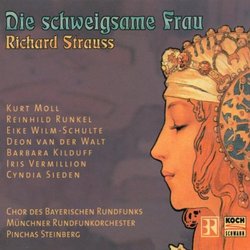| All Artists: Richard Strauss, Pinchas Steinberg, Kurt Moll, Reinhild Runkel, Barbara Kilduff Title: Strauss: Die Schweigsame Frau Members Wishing: 0 Total Copies: 0 Label: Koch Schwann Release Date: 7/23/2002 Genre: Classical Style: Opera & Classical Vocal Number of Discs: 2 SwapaCD Credits: 2 UPC: 099923658122 |
Search - Richard Strauss, Pinchas Steinberg, Kurt Moll :: Strauss: Die Schweigsame Frau
 | Richard Strauss, Pinchas Steinberg, Kurt Moll Strauss: Die Schweigsame Frau Genre: Classical Written between 1934 and 1935, this opera is vintage late Strauss and contains some of his most beautiful music. The text is by the eminent Austrian writer Stefan Zweig, who became Strauss's librettist after the death of H... more » |
Larger Image |
CD Details
Synopsis
Amazon.com
Written between 1934 and 1935, this opera is vintage late Strauss and contains some of his most beautiful music. The text is by the eminent Austrian writer Stefan Zweig, who became Strauss's librettist after the death of Hugo von Hofmannsthal. Their collaboration was extraordinarily harmonious, but Zweig was a Jew, and when the Nazis seized power, Strauss was compelled to terminate their partnership. However, the opera was premiered in Dresden, Germany, in 1935 with Hitler's approval and scored a resounding, though short-lived, success. Strauss fell into disfavor with the regime, and the work was dismissed as inferior and not performed again in Germany until 1946. Thus, its neglect is due entirely to its troubled political history. The libretto is based on Ben Jonson's comedy about a crotchety, rich old admiral whose damaged eardrums demand a quiet house. Finding that his nephew has joined an opera troupe, he disinherits him and is tricked into a fake marriage to the nephew's beautiful young wife, who is disguised as a timid girl who promises to be "silent" but instead assaults him with noise. His anger at discovering the deception turns to amused relief, leading to reconciliation with the young couple. Zweig redeemed this improbable plot with his verbal virtuosity and radiant poetry, retaining its mordant wit but humanizing the characters. Strauss found the result extremely congenial, and indeed, from the introduction (called "Potpourri") to the old man's final hymn praising quiet contentment, his inspiration never flagged. He used every operatic convention: spoken words, splendid ensembles, love duets, and arias of beguiling beauty. The score abounds with tantalizing echoes of Strauss's own operas as well as those of Monteverdi, Rossini, and Mozart; the orchestration is masterful, rich yet transparent. The vocal writing is ecstatic but fiendishly difficult; the soprano's acrobatic coloratura goes up to high E. Cyndia Sieden sounds a bit shrill but negotiates it admirably; tenor Deon van der Walt is a lovable hero, and baritone Elke Wilm-Schulte a suave intriguer. In the demanding central role, bass Kurt Moll sings beautifully and makes the transitions from uncontrolled irascibility to hesitant tenderness and warm-hearted generosity utterly believable. Unfortunately, this excellent recording has an incomprehensible major flaw: it is clear from the libretto that the work has been heavily cut. --Edith Eisler
